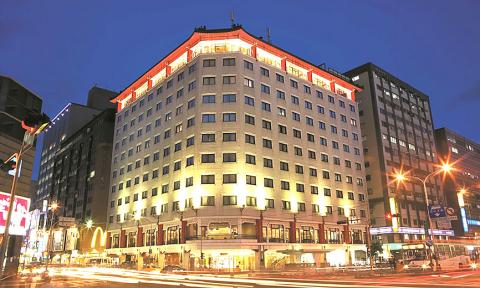Leofoo Tourism Group (六福旅遊集團) yesterday said that it would close its 48-year-old Leofoo Hotel (六福客棧) in Taipei’s Zhongshan District (中山) on May 31 to pave the way for a regeneration project and curb losses caused by the COVID-19 outbreak.
The group said it previously planned to close the facility at the end of this year, but decided to move up the schedule to cope with a sharp decline in business.
Hotels and restaurants have been hit hard by the outbreak, which has kept people at home to avoid infection.

Photo: Wang Yi-hung, Taipei Times
The hotel’s Chinese Golden Phoenix Restaurant (金鳳廳) would close on March 31 and the guestrooms would follow on May 31, the group said.
The group — which also owns the Courtyard by Marriott Taipei (六福萬怡) in Taipei’s Nangang District (南港) as well as Leofoo Resort (六福莊), Leofoo Village Theme Park (六福村) and other recreational facilities — last year gained the Taipei City Government’s approval to regenerate Leofoo Hotel.
The closure would not affect guests who have purchased hotel or restaurant vouchers, the group said, adding that they can receive full refunds or use the vouchers at affiliated facilities.
The group said it would help its employees find work at affiliated facilities or other hotels and restaurants, adding that it would disclose layoff details next month.
It is the second hotel the Hsinchu-based conglomerate closed in three years, after Westin Taipei in December 2018.
However, Leofoo Tourism Group said it would stay in the industry with a focus on the maintenance and cleaning of high-end properties, using the know-how it has gathered over the past 50 years.
Leofoo Hotel sits on a 380 ping (1,256m2) lot and is qualified for favorable development terms to encourage the regeneration of old and dangerous buildings.
The regeneration project might have a floor area ratio of 620 percent, allowing the construction of a 20-story building valued at up to NT$7 billion (US$232.33 million), REPro Knight Frank researcher Andy Huang (黃舒衛) has said.

UNCERTAINTIES: Exports surged 34.1% and private investment grew 7.03% to outpace expectations in the first half, although US tariffs could stall momentum The Chung-Hua Institution for Economic Research (CIER, 中華經濟研究院) yesterday raised its GDP growth forecast to 3.05 percent this year on a robust first-half performance, but warned that US tariff threats and external uncertainty could stall momentum in the second half of the year. “The first half proved exceptionally strong, allowing room for optimism,” CIER president Lien Hsien-ming (連賢明) said. “But the growth momentum may slow moving forward due to US tariffs.” The tariff threat poses definite downside risks, although the scale of the impact remains unclear given the unpredictability of US President Donald Trump’s policies, Lien said. Despite the headwinds, Taiwan is likely

When Lika Megreladze was a child, life in her native western Georgian region of Guria revolved around tea. Her mother worked for decades as a scientist at the Soviet Union’s Institute of Tea and Subtropical Crops in the village of Anaseuli, Georgia, perfecting cultivation methods for a Georgian tea industry that supplied the bulk of the vast communist state’s brews. “When I was a child, this was only my mum’s workplace. Only later I realized that it was something big,” she said. Now, the institute lies abandoned. Yellowed papers are strewn around its decaying corridors, and a statue of Soviet founder Vladimir Lenin

UNIFYING OPPOSITION: Numerous companies have registered complaints over the potential levies, bringing together rival automakers in voicing their reservations US President Donald Trump is readying plans for industry-specific tariffs to kick in alongside his country-by-country duties in two weeks, ramping up his push to reshape the US’ standing in the global trading system by penalizing purchases from abroad. Administration officials could release details of Trump’s planned 50 percent duty on copper in the days before they are set to take effect on Friday next week, a person familiar with the matter said. That is the same date Trump’s “reciprocal” levies on products from more than 100 nations are slated to begin. Trump on Tuesday said that he is likely to impose tariffs

READY TO BUY: Shortly after Nvidia announced the approval, Chinese firms scrambled to order the H20 GPUs, which the company must send to the US government for approval Nvidia Corp chief executive officer Jensen Huang (黃仁勳) late on Monday said the technology giant has won approval from US President Donald Trump’s administration to sell its advanced H20 graphics processing units (GPUs) used to develop artificial intelligence (AI) to China. The news came in a company blog post late on Monday and Huang also spoke about the coup on China’s state-run China Global Television Network in remarks shown on X. “The US government has assured Nvidia that licenses will be granted, and Nvidia hopes to start deliveries soon,” the post said. “Today, I’m announcing that the US government has approved for us